Reviews
Daniel Miller, Seth Kramer, & Jeremy Newberger
USA, 2008
Credits
Review by Katherine Follett
Posted on 07 May 2008
Source 35mm print
Categories The 2008 Independent Film Festival of Boston
David Harrison and Gregory Anderson are linguists, or scientists who study language. It is their belief that language is fundamentally a way of knowing things; the structure of a language reflects the structure of the knowledge, or the cognition, of the speaker. Harrison and Anderson have chosen to dedicate themselves to recording, studying, and preserving the world’s dying languages, of which there are many, in all parts of the globe. Through this, they believe they will preserve not just sounds, but philosophies and ways of knowing. Directors Daniel Miller, Seth Kramer, and Jeremy Newberger followed the pair on their travels in order to make The Linguists.
The film is not quite what you’d expect from this description. First, the linguists in question are not stodgy old scientists, but two youngish guys who backpack, drink, and joke their way around the world. And while they obviously take their work seriously and appreciate the gravity of their task, the documentary has a tone something like shows such as No Reservations, in which manly men travel around the world and do difficult, dangerous, and disgusting things. The camera records Harrison’s and Anderson’s amused exasperation with the deafness and senility of the last aging speakers of rare languages. It shows them being shocked, if game, to participate in a Bolivian healing ritual in which a live guinea pig is torn apart by hand. It shows them getting boozed and sweaty, dancing with the locals as they crash an Indian (as in India) tribal wedding.
All of this was entertaining, to be sure. And I never got the feeling that either the linguists or the filmmakers were actually flippant, or that they didn’t care about the work of preserving languages. But I couldn’t help wishing that the film focused more on the work and less on the “adventures.” During the main part of the film, Harrison and Anderson are shown tracking down a total of three languages (the filmmakers record a fourth, a Native American language, directly from the speaker without the linguists’ involvement) of the hundreds or even thousands that are in danger of extinction. In only one of these, a rare Bolivian language, do we hear about some of the cognitive structures that make these languages so interesting (the language counts using an unheard-of base-12 and base-20 number system; it makes for some very weird math). We also hear almost nothing about the disappearing cultures these languages represent, and even less about the actual individuals who speak the languages. An exception is the linguists’ Siberian driver, who turns out to speak a rare native Siberian language called Chulym. Unlike most of the other rare-language speakers, the driver is relatively young and articulate. Combine these oversights with the party-guy atmosphere, and the film seems strangely prejudiced, as though it finds only the young and charismatic interesting enough to bother recording. On the other hand, perhaps the filmmakers thought that only the young and charismatic would be interesting enough for the audience to bother watching. After all, linguistics is a small branch of science, and the idea of language and cognition interacting is somewhat abstract and very difficult to film. Even the most iconic linguist, Noam Chomsky, makes films that are pretty bone-dry.
But still: this film is about a human tragedy; the gradual loss not just of languages, but also of ways of life, and of individual people. I think The Linguists could have been a better, more powerful documentary if it had chronicled the ways and lives of some of the people Harrison and Anderson were trying to record, instead of just Harrison and Anderson’s adventures as they tried to record them. These people are some of the most rare, unusual, and endangered people on the planet. Harrison and Anderson are pretty much regular American white guys. I know which I’ve seen before. It seemed that the film missed a perfect opportunity to show more of these languages, to expose audiences to ideas about philosophy and cognition, and to publicize the plight of indigenous people everywhere. The audience at the IFFB seemed very receptive to the more obscure, academic side of the subject. (When the film mentioned Chulym, the Siberian language, the man in the seat next to me even nodded in recognition.) I don’t personally have any experience with linguistics, but even to a layman, the little bits of novel sounds and philosophies were fascinating. I wanted more. While the documentary was well made and entertaining, and its subjects (meaning Harrison and Anderson) were fresh and funny, I feel it was something of a missed opportunity.
More The 2008 Independent Film Festival of Boston
-

Crawford
2008 -

Vexille
2007 -

American Teen
2008 -
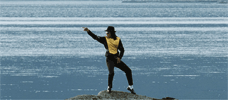
Mister Lonely
2007 -

Intimidad
2008 -

Meadowlark
2008 -

Second Skin
2008 -

Transsiberian
2008 -
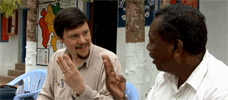
The Linguists
2008 -

Big Man Japan
2007 -

At the Death House Door
2008 -
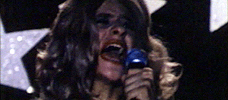
The Beaver Trilogy
2000 -
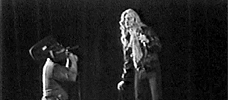
The Beaver Trilogy
2000 -

Nerdcore Rising
2008 -

Goliath
2008 -

The Tracey Fragments
2007 -

Saviours
2008 -

Medicine for Melancholy
2008 -

Severed Ways
2007 -

Not Your Typical Bigfoot Movie
2008 -

Not Your Typical Bigfoot Movie
2008 -
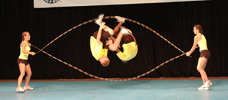
Jump!
2007 -
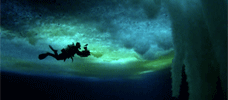
Encounters at the End of the World
2007
We don’t do comments anymore, but you may contact us here or find us on Twitter or Facebook.



